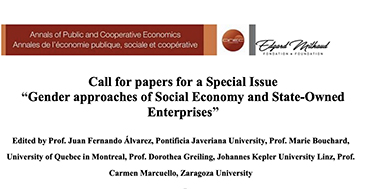The CIRIEC International – Edgard Milhaud Foundation journal ‘Annals of Public and Cooperative Economics’ calls for papers for a special issue entitled “Gender Approaches of Social Economy and State-Owned Enterprises”. The deadline for all submissions for the Special Issue is June 1st, 2024.
According to CIRIEC International, the growth of inequality, precarious working conditions, the climate crisis, the loss of democratic capacity, and the increase in territorial violence are some of the major global challenges of our time. “In many cases, women and gender minorities are at the heart of these issues, both as victims and as promoters of alternatives to curb the risks involved.”
Social economy and state-owned enterprises share a mission to transform the economy, its methods and its outcomes, so that it serves sustainability and improves the well-being and empowerment of individuals, communities, and territories.
CIRIEC calls for articles that identify the spaces, challenges, and opportunities that these organizations share from a gender perspective. Analyses from different disciplines such as economics, sociology, law, or history will be valued.
Specifically, several areas of research are proposed. Among them, deepening the articulation between social economy and feminist economics.
It is also proposed to analyze the challenges for social economy organizations in the field of gender inequality, including vertical and horizontal segregation, pay gaps and other relevant issues. Understanding in detail the key factors that promote or hinder effective equality within these organizations, and identifying the levers that can help or hinder the achievement of gender equality in SSE.
Measuring the impact of policies and practices
The special issue also aims to measure the impact of policies and practices introduced to reduce inequalities. “Defining critical indicators and the measurement of their evolution over time, based on a longitudinal approach, will make it possible to demonstrate the progress that making in favour of gender equality and to identify and understand the key elements that have a greater impact on this evolution”, says CIRIEC.
Articles addressing the success factors and failures of female representation in the governing bodies of public enterprises at all levels of government (national, regional, and municipal) will also be very interesting, all in light of the public sector’s commitments towards the Sustainable Development Goals (SDGs) and the OECD Principles for gender-diverse boards of state-owned enterprises.
Finally, the special issue encourages taking stock of how gender issues are addressed in SDG reporting, sustainability reporting, as well as gender-related management practices in enterprises.
For more information, please contact: Dorothea.Greiling@jku.at, cmarcue@unizar.es







